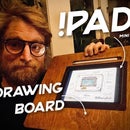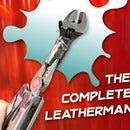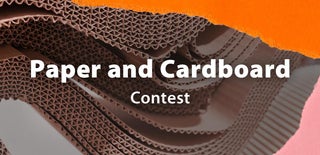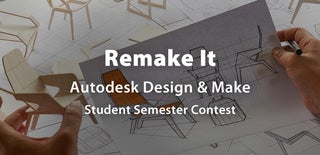Introduction: Portable Leather Workshop
For some time now I've had all my leather tools stuffed into two or more boxes. It's not been much fun starting a leather project when I know my tools are scattered around. When I have an idea and I want to test it I want to dive in not wading through unneeded equipment and tools.
As I always do, I make a box for starters. As you'll see in the next step I made two. One for my leather tools and one for my repair kit.
I've got several unfinished and still not started leather projects which I now attack with my new Portable Leather Toolbox.
Supplies
As a beginner leather maker, I do well with cheap and simple tools.
I can see getting more quality tools will improve my work but for now, I'm really happy with what I have.
Here are a few must-have tools:
LeatherCraft Stitching Punch Tool
Many of the tools were from earlier projects so no need for upgrading yet.
Step 1: The Box…
It all began with a shelf of some sort I found in the trash. It was wide enough to be cut in half and make up for two new boxes. Hinged at both sides I could open it with full access to everything at once. I did some remodeling of the shelvings inside to have open walls on one side. But as you can see a pretty basic interior plan.
Step 2: Grouping the Tools…
Before starting to add tools to the different parts of the box I did a grouping of all the tools I have so far. Both to get an overview and a sense of required space needed. I also wanted to make sure I had some room left over for future tools to arrive. I was amazed at how much I have already compiled. Got to do more rawhide:-)
Step 3: Constructing the Interior
After placing everything out I could start mounting and fixing the holders and hooks for the tools and parts. A drawer was convenient at the base. I made shelvings and clamps where tools were best suited.
Step 4: 3D Print for Saving Space
Space is always limited in my experience so whenever possible I'll make smaller containers and compartments with my 3D printer. This time I wanted to be able to pull out the smaller containers from the bottom drawer. This is really straight forward in Fusion 360. Drawing up the size of the container is done in a second, next pull the rectangle up to its desired height. Now comes the best part right-clicking you cube, choose infill and… booooom you have a box. Now a smart little trick is to make one of the sides, bottom (preferably the one pointing out) rounded ---> fillet. This is great when the contents of your container are small and hard to pick up with your fingers. With the rounded edge you just "pull" it out.
I also made some smaller containers for easy access on the middle shelves.
Large parts box
70mm x 40mm x 40mm
Small parts box
120mm x 80mm x 10mm
Boxes for organizing leather tools: thingiverse.com/thing:4375907
Step 5: "Hidden" Storage and Helping Hand!
To make full use of all available space I made a fold out-door. This added an extra 2 panels of space. Some of the lager tools need this and I really don't want to have an extra bag of tools hanging from this box:-) I hinged it with a wood plug and an IKEA metal plug used for holding shelves in place, then I rounded off the wood hinge back part so it would be flush with the inner wall.
Step 6: Circle Guide Cutter and the Rest…
So here we go! This was utterly satisfying, seeing every piece find it's place and still have room for more.
I'm especially proud of the circle guide cutter made from leftover washers welded together. It fits perfectly on the inside of the fold-out door.
Step 7: What Dosen't Fit Inside…
…must fit on the outside! The back of the box is perfect for storing the cutting and hammering mats. They are kept in place by the centered lock at the top. You slide them in place on the narrow ledge with a lip keeping them steady.
Step 8: One More Thing…
Light, needle… ACTION!
My builds almost always end up with some kind of lighting. This time was no exception and for this type of toolbox… really useful. You pull the light arm out and flick the switch (which I 3D printed, files attached).
This strip of LEDs are powered by a 9-volt battery, but there is also a 12-volt contact on the outside. The brightness increases at 12V, but I find 9 is enough.
Step 9:
From now on I will have all my leather tools in one place and a handle to carry them around. I like having specific toolboxes so I can bring them when traveling on vacations or working form new locations.
I'd love it if you have any tips on tools I'm missing out on or other leather making tricks!
Wonder what leather projects I've got in the pipeline, please head over to @smogdog future builds!

First Prize in the
Declutter Speed Challenge













